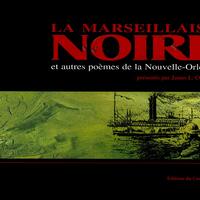-
Title
-
La Marseillaise noire et autres poèmes français des Créoles de couleur de la Nouvelle-Orléans, 1862-1869
-
This edition
-
"La Marseillaise noire et autres poèmes français des Créoles de couleur de la Nouvelle-Orléans, 1862-1869." Ed. James Lorenz Cowan. Lyon: Éditions du Cosmogone, 2001. 141 pp.
-
Table of contents
-
N/A; but includes:
● Anon. / Combat de l'aigle républicain et du copperhead
● Anon. / Le Droit de suffrage des noirs (1866)
● Anon. / Le Triomphe des opprimés
● Anon. / Les Tyrans au tribunal de l'histoire
● "Anthony" / [poem]
● Adolphe Duhart / La Fleur blessée
● "Berthe D . . . t" [possibly Adolphe Duhart] / [poem]
● "Lélia D." [Adolphe Duhart] / [poem on Abraham Lincoln]
● "E. H." / [poem on André Caillou]
● "Henry" [Henry Train?] / L'Ignorance (Sept. 1862 in "L'Union"; revised version 28 May 1865 in "La Tribune")
● Armand Lanusse / [poem]
● Camille Naudin / La Marseillaise noire
● Camille Naudin / Ode aux martyrs
● Charles Potvin / La Tolérance (1867)
● Joanni Questy / [poem]
● "Schneitz" / Le Triangle sacré
● Henry Train / [poem on Washington and Lincoln]
● Henry Train / Résignation
● "Yacoub" [J. Mansion] / La Poésie
-
Publisher's description
-
● "Ce livre nous offre un précieux trésor arraché à un sommeil de plus d'un siècle. Voici les poèmes écrits en français pendant la guerre de Sécession par les Créoles de couleur de la Nouvelle-Orléans luttant pour la démocratie : de brûlants appels à la liberté, à l'égalité, à l'émancipation des Noirs, aux droits civiques, un émouvant hommage à la France de la Révolution et du Romantisme. Ces poèmes, James Cowan les a découvert parmi les feuillets jaunis des journaux de l'époque qui dormaient, ignorés, dans les bibliothèques louisianaises. Il les a fait précéder d'une passionnante présentation. Le résultat de son travail, un livre vivant et vibrant qui enthousiasmera autant les curieux d'Histoire, que les amoureux de la grande Poésie française et les militants des Droits de l'Homme : un monument retrouvé de la francophonie."
-
Anthology editor(s)' discourse
-
● "Louisiana's free black Creoles, eighty percent of whom could read and write in 1850, boasted a higher literacy rate than the white population, as James Cowan points out in 'La Marseillaise Noire'" (Jennifer Gipson. "Introduction." "The Stories That History Tells Us: Afro-Créole Literature from 19th-Century Louisiana." Centenary College of Louisiana. n.d. Web.
-
Gipson, "Introduction" Centenary College of Louisiana.
-
Commentary on anthology
-
● This volume collects poems "from the 1860s by black Creole authors (and a few sympathizers) that originally appeared in 'L'Union' and 'La Tribune de la Nouvelle-Orléans' . . . The title comes from a poem by Camille Naudin (perhaps a pseudonym), who may have borrowed the phrase from Lamartine's drama 'Toussaint-Louverture'. . . . Most of the verse is in traditional forms; there is also freer verse. . . . The clichés of French Romanticism and older literary tropes are found throughout, and local color is exploited. . . . The raison d'être of the anthology is, however, political and social. . . . Thanks to the changes in law brought by the Civil War, the racial disadvantage under which the poets had lived and continued to live even then could be addressed freely, even as they acknolwedged how conditions had changed; these themes mark the anthology much more than [they do] 'Les Cenelles'" (Catharine Savage Brosman. "Louisiana Creole Literature: A Historical Study." Jackson: UP of Mississippi, 2013. 87-89)
"Another poem by Naudin, 'Ode aux martyrs,' compares the martyrdom of the Louisiana blacks and certain supporters of theirs to the Saint-Bartholomew massacre of Protestants in France under Charles IX (the resemblance is noted elsewhere also). In particular, the martyrs John Brown, a white northern dentist named Dostie, and a certain Victor Lacroix (on whose name Naudin plays) are mentioned, along with others killed in the bloody Mechanics' Institute uprising of July 1866" (Brosman 2013: 89).
"Titles such as 'Votre temps est passé!' (addressed to the exploiters of the past), 'Les Tyrans au tribunal de l'histoire,' 'Le Triomphe des opprimés,' 'Combat de l'aigle républicain et du copperhead' are transparent. The respective poems are all anonymous (as if reprisals might be feared). The deceased Abraham Lincoln, called a regenerator and martyr, is celebrated by 'Lélia.' 'E. H.' celebrates André Caillou, a hero of the Creoles of Color, and evokes 'Liberty, our mother' and the Union" (Brosman 2013: 89).
"Under the signature 'Henry,' 'L'Ignorance' appeared first in September 1862 in 'L'Union', then was revised and republished 28 May 1865 in 'La Tribune.' . . . M. Lynn Weiss believes that 'Henry' may be Henry Train, a white attorney who clearly had ties to the Creoles of Color and was among the white journalists who contributed to the paper. (In addition, Train is represented by name in 'La Marseillaise noire' by a short poem on Washington and Lincoln and a lovely pastoral meditation, 'Résignation.') Noteworthy are mentions of the nineteenth-century idol of progress and belief in reason, of which ignorance is the enemy, as well as allusions to Socrates, Jesus Christ, Joan of Arc, Galileo (persecuted for his use of reason), and eighteenth- and nineteenth-century visionaries and socialists" (Brosman 2013: 90). "'Henry' published in 'La Tribune' another poem of note, not collected here, 'La Rébellion du sud en permanence.' It concerns his 'muse,' who has been silent, since, as he explains, poetry is not permitted to curse, to execrate, not even the oppressors of his race. The poet proceeds to list the wrongs visited by the South on slaves and now freedmen. These wrongs include an attempt by white supremacists to circumvent the 1864 constitution, whose machinations led to the Mechanics' Institute massacre" (Brosman 2013: 91-92).
-
Item Number
-
A0545
 Front cover
Front cover